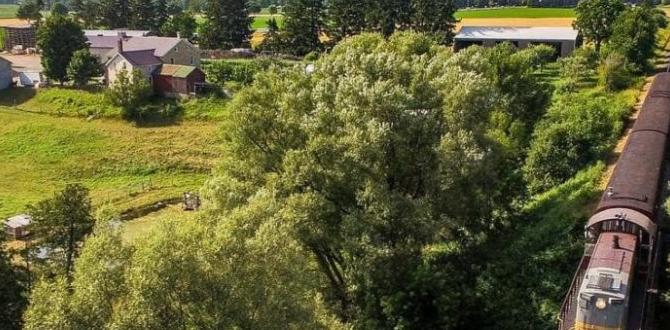Algeria’s local markets and street food are a feast for the senses, offering authentic flavors and vibrant experiences. This guide unlocks the best delights to explore, making your culinary adventure easy and unforgettable.
Ever dreamt of wandering through bustling souks, the air alive with enticing aromas and colorful sights? Algeria offers just that, a journey into its heart through its vibrant local markets and delicious street food. Sometimes, knowing where to start or what to try can feel a little overwhelming, especially when you’re seeking genuine, local tastes.
But don’t worry, I’m here to guide you! This article will be your friendly companion, breaking down the essential delights you absolutely must experience. Get ready to discover some truly essential flavors that will make your Algerian adventure memorable.
Exploring Algeria’s Vibrant Local Markets
Algerian markets, often called souks or assouqs, are more than just places to shop; they are the pulsating heart of daily life. They are where communities gather, stories are shared, and tradition thrives. Stepping into one is an immersive experience, a sensory symphony of sights, sounds, and smells. You’ll find everything from fresh produce and fragrant spices to handcrafted goods and lively banter.
These markets are perfect for getting a true feel for Algerian culture. They offer a chance to interact with locals, practice a few words of Arabic or Tamazight, and discover unique treasures. For travelers, they represent an authentic slice of life, far from the tourist traps. It’s here you’ll find the ingredients that make Algerian cuisine so rich and diverse, and it’s also where many of the street food delights begin their journey.
What to Expect in an Algerian Souk
Prepare for a delightful chaos! Here’s a glimpse of what awaits you:
- A Sensory Overload: The air is often thick with the scent of mint tea, roasting meats, and exotic spices like cumin, coriander, and saffron. Vibrant displays of colorful textiles, pottery, and fresh fruits create a visual feast.
- Bargaining Culture: Haggling is an expected part of the shopping experience. Approach it with a smile and good humor. Start with a lower offer and meet somewhere in the middle. It’s more about the interaction than just the price.
- Local Crafts: Look for beautiful handcrafted items such as leather goods, intricate jewelry, woven baskets, and traditional clothing like djellabas.
- Fresh Produce: Seasonal fruits and vegetables are piled high, offering a look at the region’s agricultural bounty.
- Spices and Teas: You’ll find an incredible array of spices, often ground fresh, and a variety of local and imported teas.
For a deeper understanding of Algerian culture and an excellent starting point for locating markets, the cuisine section on Lonely Planet’s Algeria page offers valuable insights into local food traditions that are often showcased at these markets.
Essential Algerian Street Food Delights
Algerian street food is an essential part of its culinary heritage. It’s affordable, delicious, and offers a direct taste of local life. These quick, flavorful dishes are perfect for travelers on the go, easily fueling your explorations. Whether you’re grabbing a quick bite between market stalls or seeking a satisfying meal from a roadside vendor, street food is where you’ll find some of the most authentic flavors.
Sampling street food is a rite of passage for any adventurous eater. It allows you to try a wide variety of tastes without committing to a full restaurant meal. Plus, the experience of watching your food being prepared right in front of you is part of the fun. From savory pastries to hearty stews, Algerian street food has something for everyone.
Must-Try Street Food Dishes
Here are some absolute must-tries that you’ll find at markets and street stalls across Algeria:
1. Mechoui & Brochettes (Grilled Meats)
What it is: Mechoui refers to slow-roasted lamb or mutton, often cooked whole over charcoal. Brochettes are grilled skewers of marinated lamb, beef, chicken, or even spicy merguez sausage. These are staples at any gathering and widely available from street vendors, especially during evenings and weekends.
Why it’s essential: The smoky, tender meat infused with spices is incredibly flavorful. It’s a simple yet profound taste of Algerian grilling traditions.
Where to find it: Look for outdoor grills in busy areas, especially near markets and public squares. Often, vendors will have a spit roasting whole lamb or a display of skewers ready to be grilled.
2. Tajine (Slow-Cooked Stew)
What it is: While many associate Tajine with Moroccan cuisine, Algeria has its own delicious variations. It’s a slow-cooked stew, typically made with meat (lamb, chicken, beef), vegetables, and a blend of aromatic spices, all simmered in a conical clay pot. Street versions might be served in smaller portions, perfect for a quick meal.
Why it’s essential: It’s hearty, deeply flavorful, and showcases the rich spice profiles of Algerian cooking. The slow cooking makes the meat incredibly tender.
Where to find it: Look for vendors with large pots bubbling away, often near food courts or busy intersections. You might see it served with bread for dipping.
3. Chorba (Hearty Soup)
What it is: Chorba is a ubiquitous and comforting soup, especially popular during Ramadan but enjoyed year-round. Algerian Chorba is often a rich tomato-based broth filled with lamb or chicken, chickpeas, lentils, and vermicelli, seasoned with herbs like coriander and parsley.
Why it’s essential: It’s a flavorful, filling, and warming dish that represents homestyle cooking. A good bowl of Chorba is incredibly satisfying.
Where to find it: Many small eateries and street vendors will offer steaming bowls of Chorba, particularly in the mornings and throughout the day.
4. M’sef (Sweet Pastries)
What it is: M’sef are delicious, often diamond- or triangle-shaped pastries made from layers of thin dough, usually filled with almonds or other nuts, and then soaked in honey or syrup. They are frequently garnished with sesame seeds or pistachios.
Why it’s essential: A perfect sweet treat to accompany mint tea or to satisfy a craving for something sweet. They are wonderfully fragrant and not overly heavy.
Where to find it: Found in most bakeries and pastry shops, and sometimes sold by vendors in markets.
5. Bourek (Savory Pastry Rolls)
What it is: Bourek are crispy, fried or baked pastry rolls commonly filled with seasoned ground meat (lamb or beef), potatoes, onions, or a combination of cheese and herbs. They are similar to a savory spring roll but with distinct Algerian spices.
Why it’s essential: An incredibly popular snack or appetizer, Bourek are crispy, savory, and addictive. They are versatile and always a crowd-pleaser.
Where to find it: Widely available from street food stalls, snack bars, and in cafes, especially during lunchtime and evenings.
6. Makrout (Semolina Pastry)
What it is: Another beloved sweet pastry, Makrout is made from semolina dough, often stuffed with dates or almonds, diamond-shaped, then fried and soaked in honey. It has a distinct, crumbly texture and a rich, sweet flavor.
Why it’s essential: A classic Algerian sweet treat, Makrout is a testament to the country’s love for honey-sweetened pastries. It’s a taste of pure indulgence.
Where to find it: Available in bakeries, pastry shops, and from dedicated sweet vendors at markets.
7. Baghrir (Spongy Pancakes)
What it is: Baghrir are light, spongy pancakes, often called “thousand-hole crepes” due to their unique texture. They are typically served warm, drizzled with honey and butter, or sometimes with jam. They are made from a batter of semolina and flour.
Why it’s essential: Their light, airy texture and simple yet delightful sweetness make them a perfect breakfast or snack. They are a comforting and classic Algerian delicacy.
Where to find it: You can find them at many cafes and breakfast spots, and sometimes from specialized street vendors.
Tips for Enjoying Algerian Street Food Safely
Eating street food anywhere in the world can sometimes raise questions about safety and hygiene. Algeria is no different, but with a few simple precautions, you can enjoy its delicious offerings with peace of mind. My travel experiences have taught me that confidence comes from preparation and awareness. This is especially true when considering comfort and regularity, even for everyday needs during travel—things like comfortable adult diapers or easily accessible child diapers can significantly reduce stress, allowing you to focus on the adventure and the food!
Here are some practical tips to ensure a safe and enjoyable street food experience in Algeria:
- Look for Busy Stalls: High turnover means food is fresh. Popular stalls with long queues are usually a good sign of quality and safety.
- Observe Hygiene Practices: Check if the vendor handles money and food separately, uses clean utensils, and keeps their cooking area tidy.
- Opt for Newly Cooked Food: Food that is cooked fresh to order or has just been prepared is generally safer than food that has been sitting out for a long time.
- Drink Bottled Water: Always opt for bottled water. Avoid tap water and ice cubes if you have a sensitive stomach.
- Start Slowly: If you’re not used to different cuisines or street food, start with cooked items and gradually introduce other foods to see how your body reacts.
- Trust Your Instincts: If a stall or food looks or smells questionable, it’s best to move on.
For general travel health advice, the Algeria page on the CDC Traveler’s Health website provides excellent, authoritative guidance on staying healthy while traveling abroad.
Beyond the Plate: The Cultural Experience
Eating street food in Algeria is about more than just satisfying hunger; it’s a cultural immersion. It’s about the chatter of the vendors, the friendly smiles of fellow diners, and the vibrant atmosphere of the markets. It’s about connecting with the local rhythm of life.
When you’re enjoying a warm bourek or a savory tajine from a street stall, you’re participating in a tradition that has been passed down through generations. These interactions are often the most memorable parts of any trip. They offer genuine insights into the warmth and hospitality of the Algerian people.
What to Pair with Your Street Food
No Algerian street food experience is complete without the perfect beverage:
- Mint Tea (Thé à la Menthe): The quintessential Algerian drink is sweet, refreshing, and always served hot. It’s the perfect accompaniment to any savory or sweet dish.
- Freshly Squeezed Juices: At markets, you’ll often find vendors squeezing fresh oranges, grapefruits, or other seasonal fruits right before your eyes.
- Lablabi: A savory chickpea and bread soup, often sold from carts. It’s a hearty and flavorful option, especially popular in some regions.
Navigating Markets and Food Stalls: A Practical Approach
When you arrive at a busy Algerian market or a street food hub, it can feel a bit overwhelming at first. But a structured approach can make exploring easy and enjoyable. Think of it like packing for a trip – having essentials ready makes everything smoother. This is why I always emphasize having practical travel companions, from comfortable luggage to reliable adult and child diapers, ensuring peace of mind so you can fully embrace new experiences without worry.
Here’s a simple way to approach your culinary exploration:
- Start with a Reconnaissance Mission: Walk through the market or area first without buying anything. Get a feel for the layout, identify different types of food available, and note down any stalls that particularly catch your eye or have a good buzz.
- Observe and Learn: Watch how locals order and eat. This can give you cues on portion sizes, popular dishes, and how to interact with vendors.
- Engage with Vendors: Don’t be afraid to ask questions (even with gestures if language is a barrier). Many vendors are proud of their food and happy to explain!
- Prioritize Your Cravings: Have a mental list of a few things you really want to try. This helps you focus your culinary adventure.
- Pace Yourself: Don’t try to eat everything at once. Sample a little from several places to experience a wider variety of flavors.
For a visual and practical understanding of how to navigate busy environments, resources on urban exploration and market sociology can offer insights, though specific Algerian market guides are less common. However, general tips on engaging with local commerce, like those found in guides about interacting with street vendors, apply well.
A Sample Culinary Tour Itinerary
To give you an idea of how to structure your street food exploration, here’s a sample itinerary focusing on different times of day and types of food:
Morning Market & Breakfast Delights
- Visit a local market: Explore the produce and spice stalls as they come alive.
- Breakfast: Enjoy fresh Baghrir with honey and mint tea from a local cafe or bakery near the market.
- Snack: Pick up a fresh fruit juice.
Lunchtime Savory Bites
- Find a busy lunch spot: Look for vendors selling Chorba or Tajine.
- Try Bourek: Grab a few crispy Bourek rolls filled with meat or vegetables.
- Pair with: A refreshing bottle of water or maybe a local soda.
Afternoon Sweet Treats
- Market Pastry Hunt: Seek out M’sef and Makrout from a renowned pastry vendor in the souk.
- Relax: Sit down with a mint tea and savor your sweet selections.
Evening Grills & Dinner
- Evening Grub: As the sun sets, find a street vendor grilling Mechoui or Brochettes.
- Try Merguez: If you like a bit of spice, order some grilled Merguez sausage skewers.
- Enjoy the Atmosphere: Many street food areas become lively social hubs in the evening.
This flexible itinerary can be adapted based on the specific location in Algeria you are visiting, as regional specialties can vary.
Conclusion
Algeria’s local markets and street food scene is an unmissable adventure for any traveler. It’s a vibrant, delicious, and authentic way to connect with the country’s culture and people. From the smoky aroma of grilled meats to the sweet delight of honey-drenched pastries, each bite tells a story. By following these tips and embracing the sensory journey, you can confidently explore the bustling souks and sample the essential delights that Algeria has to offer.
Remember, travel is about embracing new experiences, and the flavors discovered in Algerian markets and from its street vendors will undoubtedly be among your most cherished memories. So, pack your sense
Frequently Asked Questions
Q1: Is it safe to eat street food in Algeria?
A1: Generally, yes. Following the tips provided (look for busy stalls, observe hygiene, choose freshly cooked food) significantly reduces any risk. Many Algerians eat street food daily with no issues.
Q2: What is the most iconic Algerian street food?
A2: While subjective, Chorba (soup), Bourek (pastry rolls), and grilled meats like Brochettes and Mechoui are considered iconic and widely loved street food staples.
Q3: Do I need to know Arabic to order street food?
A3: While knowing some basic Arabic or Tamazight phrases is helpful and appreciated, it’s often not strictly necessary. Pointing, using gestures, and learning the names of dishes can get you by effectively.
Q4: What drinks are popular with street food?
A4: Mint tea is the national drink and pairs well with everything. Freshly squeezed fruit juices are also very popular, especially during warmer months.
Q5: Can I find vegetarian street food options?
A5: Yes. While meat is common, many stalls offer vegetarian versions of Bourek (e.g., cheese or potato filled), and vegetable-based Tajines or Chorba are also available. Fresh fruits and bread are also readily available.
Q6: What should I carry for street food exploration?
A6: Carry small denominations of Algerian Dinars (DZD) for easy transactions. A small wallet or money belt is advisable for security in crowded markets. Hand sanitiser is also a good idea.





